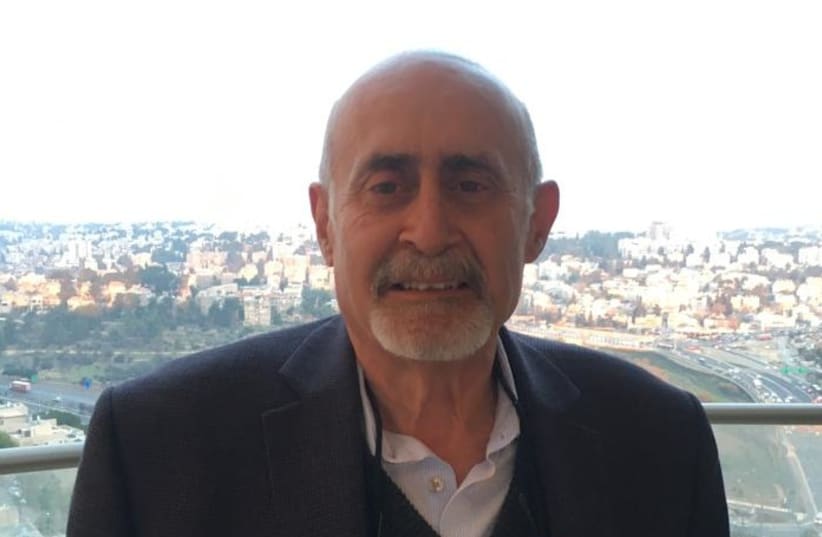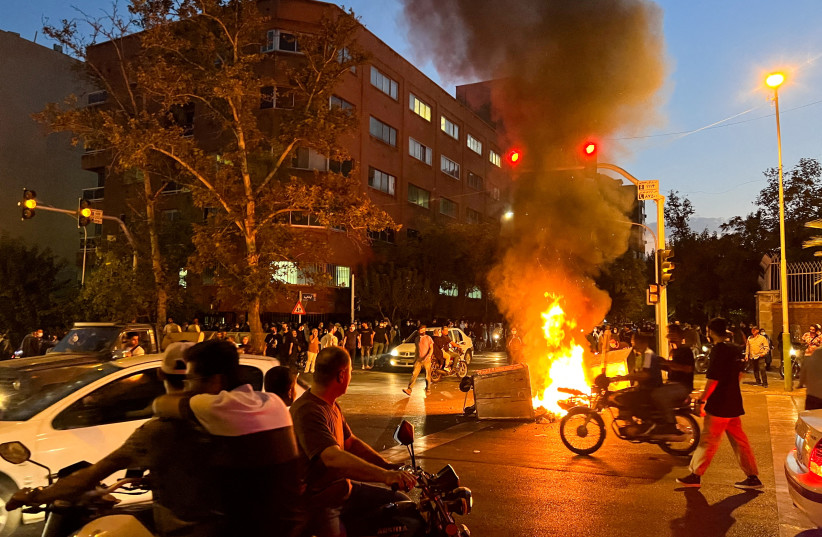Tehran-born George Haroonian sat down last week with The Jerusalem Post to discuss the revolts unfolding in the Islamic Republic of Iran against the clerical regime, Israel-Iran relations and his fight to win the release of wrongfully incarcerated Iranian Jews.
Haroonian, who is one of the leading voices of the Iranian-Jewish community in the United States, launched a campaign in 2000 to secure the freedom of 13 Iranian Jews arrested by the regime in Shiraz based on a bogus charge of espionage.
Ongoing protests in Iran
He is closely following the protests that have engulfed Iran since the death of 22-year-old Mahsa Amini after her arrest by the regime’s infamous morality police. The regime seized Amini because she allegedly did not properly cover her hair with the mandatory hijab.
Iranians “have come to the realization that the regime cannot be improved or reformed,” Haroonian said. “That is why they have revolted.”
Since the protests broke out last September, 476 protesters have been killed, according to Norway-based human-rights group Iran Human Rights (IHR). The US-based Human Rights Activists News Agency said 19,000 Iranians have been arrested.
“I believe a paramount mission of those of us among Iranians born Jews who have lived outside of Iran is to be bridges of understanding between the countries that we have lived and the Iranian people.”
George Haroonian
Haroonian, who lives in southern California, was born in Tehran in 1953 and departed for the US to study in 1970.
Haroonian, who lives in southern California, was born in Tehran in 1953 and departed for the US to study in 1970.
The regime’s rulers “have turned a rich country into a poor country,” he said, and the revolts are “a turning point in history. It is not limited to what women want to wear. This [has] to do with the role of women in society and freedom of choice. The pot has boiled over.”
“I believe a paramount mission of those of us among Iranian-born Jews who have lived outside of Iran is to be bridges of understanding between the countries where we have lived and the Iranian people,” Haroonian said. “For those of us who are Iranian Americans, [it] is very important to present the truth of Iranian heritage and cultural values to the American public and media – their humanism, hospitality and kindness – and distinguish it from the ideological regime, which uses hate and mistrust as a foundation of their world stance. The cultural and political renaissance and revolution happening now in Iran make this task more immediate.”
It is the “same for Iranian Israelis, who have been great ambassadors of understanding between the two people,” he said. “Israel and Iran are potentially great partners for peace and advancement for the people of the region.”
This comes on the heels of major shifts in relations among Iranians and Israel.
Haroonian said he “noticed that Iranians are divorcing [their] ideas about Jews and Israel. They see Jews are part of Iranian history and that Israel is not their enemy. Israel is the best friend of the Iranian people because it is the only government fighting the regime” and is combating the regime “behind the scenes.”
THE PRIORITIZATION by Western governments of the nuclear issue as the be-all and end-all of relations with the Islamic Republic is misguided, Haroonian said.
The US and the other world powers – Russia, China, France, Germany and Britain – want to provide $100 billion in sanctions relief to Iran’s regime in exchange for temporary restrictions on its alleged nuclear-weapons program.
Haroonian criticized the world powers for putting their focus narrowly on the nuclear issue.
“The regime uses the nuclear issue to blackmail the West in the same way they take hostages,” he said. “It wants to dominate the region and destroy Israel.”
Haroonian’ instead urged the Western powers to “put the issue of human rights on the same level as the nuclear issue.”
The question of toppling the regime in Tehran is also front and center in his analysis, especially in his advocacy that the Western powers “recognize the will of the Iranian people and recall their diplomats and increase sanctions” against the regime. “If the Iranian opposition can form a centralized body, the West should recognize them. So far, Iranians have not done that.”
Haroonian works in the Persian carpet industry and has recently jump-started a Persian website called notoantisemitism.org, which is aimed at “enlightening Farsi speakers about antisemitism.”
When asked about German-Iranian dissidents who are pressing the German city of Freiburg to pull the plug on its twin-city partnership with Iran’s regime in Isfahan, he said he would concur.
German civil servant Michael Blume, who is tasked with fighting hatred of Israel in Freiburg, has refused to call for the end of the partnership. Blume can be called antisemitic due to some of his statements, a Hamburg court said last October. Freiburg Mayor Martin Horn has faced criticism from Amnesty International for his defense of the partnership.
Haroonian, along with 20 to 25 activists, formed the Council of Iranian American Jewish Organizations to secure the freedom of 13 Iranian Jews in 2000. The Iranian Jewish communities in Iran and in the US “did not want to make noise,” he said, and they stressed “quiet diplomacy.”
Iranian dissidents have told the Post over the years that timid diplomacy enables the regime’s repressive machinery to remain in force.
Haroonian said some people at the time saw the regime as amenable to “bazaar-like negotiations.” His organization saw Iran’s regime as “Nazi-like,” he said.
The US government has classified Iran’s theocratic state as the world’s worst state sponsor of terrorism.
Haroonian and his fellow activists launched a broad-based campaign to free the Shiraz 13. The Iranian Jewish activists in the US secured press coverage at the time and worked with congressional representatives, Rabbi Abraham Cooper and Rabbi Marvin Hier from the Simon Wiesenthal Center and Malcolm Hoenlein, the former head of the Conference of Presidents of Major American Jewish Organizations, to pressure the Islamic Republic to release the Iranian Jews.
The clerical regime arrested the Iranian Jews in 1999, and the last five of the group were released in 2003. Most of the Shiraz 13 left Iran, and some of them live in the US.

